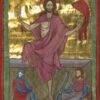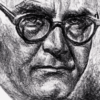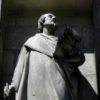Tag: Without
Pierre Maury on Imagining a World Without Christmas
What if Christ had never come? A rather counterfactual thought experiment, given the fact that He did. And yet Pierre Maury runs with this line for a moment in a Christmas sermon he gave in 1952 in his home country of France. Thinking of our odd habit of making a distinction between the things we may have with Jesus Christ and in him, and the things we think we can think we can have without him, it occurred to me to imagine a world without Christmas, a world into which Jesus Christ had never and would never come, where we…
No Vision or Knowledge of God without God’s Holiness: The Role Christ’s Sanctification for Us Plays Towards Having Genuine Knowledge of God
Εἰρήνην διώκετε μετὰ πάντων, καὶ τὸν ἁγιασμόν, οὗ χωρὶς οὐδεὶς ὄψεται τὸν κύριον, Pursue peace with all people, and holiness, without which no one will see the Lord . . . Hebrews 12:14 ὄψεται (lexeme: ὁράω), translated in the NKJV above as ‘will see’ is in the future tense third person middle indicative. I have a theological-exegetical theory: P1. Divine holiness and peace are required in order to have vision and knowledge of God. P2. Knowledge and vision of God are eschatological realities available now and for eternity to come. P3. Only Jesus Christ for us has divine holiness and peace to…
The Christian God is without Proof
“The secret things belong to the Lord our God, but the things revealed belong to us and to our sons forever, that we may observe all the words of this law. -Deuteronomy 29:29 No one has seen God at any time; the only begotten God who is in the bosom of the Father, He has explained Him. -John 1:18 For I would have you know, brethren, that the gospel which was preached by me is not according to man. 12 For I neither received it from man, nor was I taught it, but I received it through a revelation of Jesus Christ. -Galatians 1:11-12 16 For we did not follow cleverly devised tales when we made known…
Logos asarkos, Word without Flesh
Barth’s theology is often tagged as postmetaphysical in line with something like Kant’s, and more to the point, post-Kantian mediating theologians like Albrecht Ritschl, Wilhelm Hermann et al. But this is overwrought in the sense that Barth might be a trained modern theologian, nevertheless he is conditioned more by his reliance on the antique tradition found in the patristic past, and into the modern post reformed orthodox development of Protestant theology in Western Europe. Because of his influences we get a smattering, as Bruce McCormack might say, of a Barth who is both Orthodox and Modern. In this post we…
Without Grace Nature Cannot Be Perfect: Thoughts on an Irenaean Thomist Distinction
Helmut Thielicke offers an important anthropological distinction, one that stems early on from someone as astute as Irenaeus, and then becomes appropriated and modified by someone as seismic, in the Latin church, as Thomas Aquinas. If this is not understood as a basic theological-anthropological datum vis-à-vis some form of classical theism, engaging with the theological past into the present will become immediately unintelligible—which I would suggest is why so much of popular apologetics and theologics that we see pervasive, particularly in the online theological world, ends up being an exercise in futility. I digress. Let’s hear from Thielicke on this all-important…




